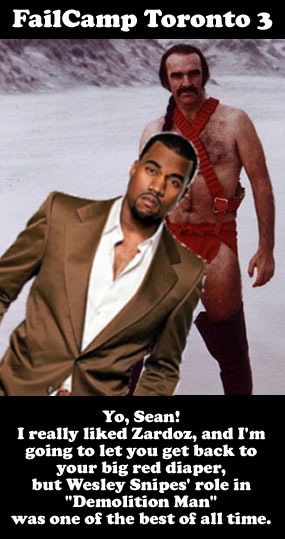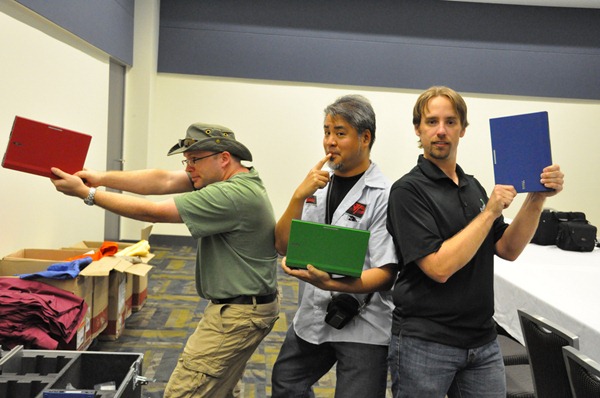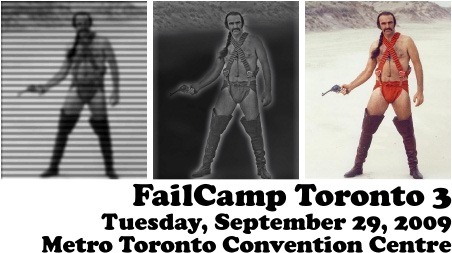That’s right, you want to join FailCamp Toronto 3, the celebration of FAIL taking place on Tuesday, September 29th at the Metro Toronto Convention Centre! Take it from Kanye, you don’t want to miss this event. For more details, see the FailCamp event page and my earlier article on FailCamp Toronto 3.
Two out of three of this afternoon’s sessions in my track at the TechDays conference – Developing for the Microsoft-Based Platform — were presented by Anthony Vranic, an independent consultant who used to be a Microsoft developer evangelist. His sessions:
- Building Modular Applications Using Silverlight and WPF
- Optimizing Your Apps for the Windows 7 User Experience
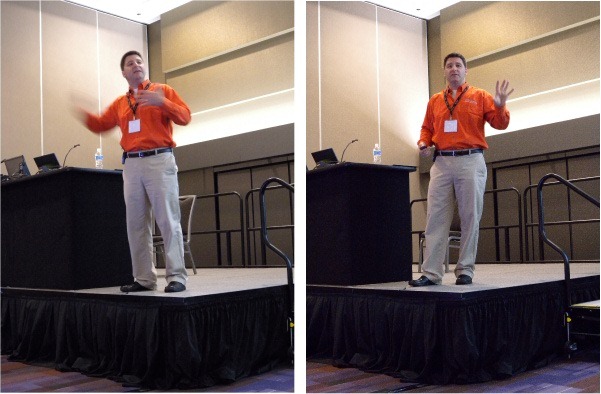
Next up were Anthony Bartolo and Mark Arteaga, who were there to present the session Taking Your Application on the Road with Windows Mobile Software, in which they showed us things that people think Windows Mobile can’t do.
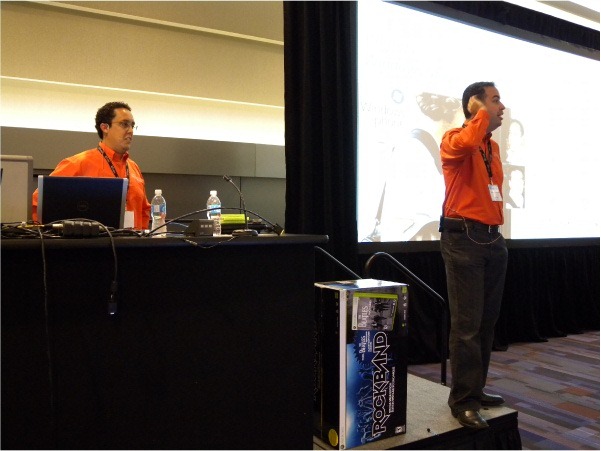
Yup, that’s The Beatles: Rock Band beside Anthony – this was a session where you could leave with a prize! They gave away XBox games to people who answered skill- and mobile market knowledge-testing questions correctly.
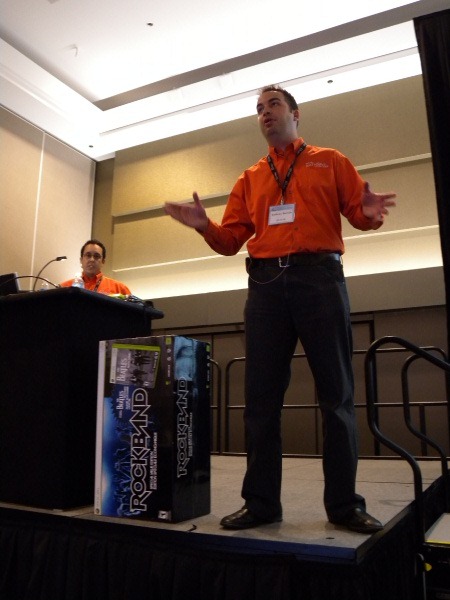
They gave The Beatles: Rock Band to the person working on the most interesting Windows Mobile app, as judged by audience applause. It went to the gentleman in the photo below on the right, who wrote a currency exchange application that watches exchange markets for the ideal time and buys foreign currencies then. He uses it to send money home to New Zealand within taking a bath on the exchange rate.

As I write this, it’s 5:45 p.m. Pacific, which means that the next event, Demo Ignite Camp, is just over an hour away.
Yesterday, while setting up for the TechDays conference at the Vancouver Convention Centre, my co-workers Rick Claus (pictured below on the left with the red netbook) and Rodney Buike (pictured below on the right with the blue netbook) and I couldn’t resist playing around with the Dell netbooks that we were using to do PowerPoint donkey-work. John Bristowe, who was doing the photography, suggested striking a Charlie’s Angels-style pose and we were only too happy to oblige:

It’s Monday, September 14th, which means that TechDays Canada 2009 has begun! We’re at the Vancouver Convention Centre in beautiful Vangroovy, the first city of sevencities we’re visiting in our tour. We’re travelling across Canada throughout the fall to show off the latest and greatest things that developers and IT pros can do with currently available tools and technologies from Microsoft.
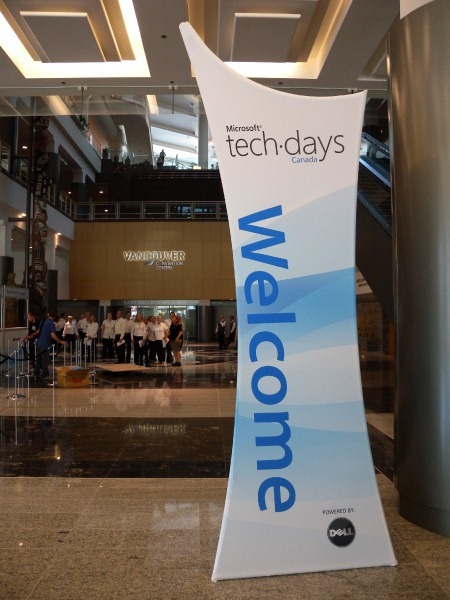
Last year, I was a mere presenter. This year, I’m the lead of the Developing for the Microsoft-Based Platform track whose abstract is below:
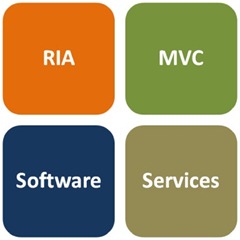
Learning key skills to develop rich client and web-based applications on the Microsoft-based platform is what this track is all about. In this track you will learn how to develop rich, interactive and interoperable applications for both the client and the web using our newest tools and frameworks. You’ll learn how to build software that helps to give your users the best experience possible, whether it’s a program running on Windows 7, a website built on ASP.NET MVC or a Silverlight-based rich internet application. You’ll also learn how to build services that can deliver data to almost any platform and internet-enabled device. And finally, you’ll learn how to build these software and services in ways that are modular and maintainable.
Here’s the room in which my track in taking place, as seen at 8:30 this morning (Pacific time, naturally), with a half-hour to go before the sessions began. We were already picking up a decent crowd:
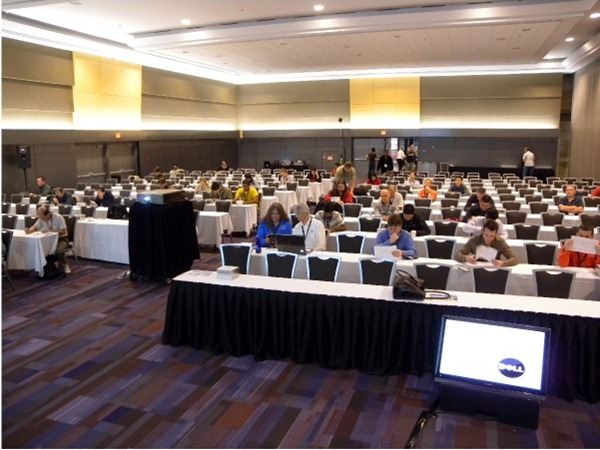
First up was Zaheera Valani of the Silverlight team doing the presentation What’s New in Silverlight 3, where she showed off the features in the latest version of Silverlight. According to the rule of thumb for Microsoft software versions, this should be the version that really catches on, and the early signs indicate that this seems to be the case.
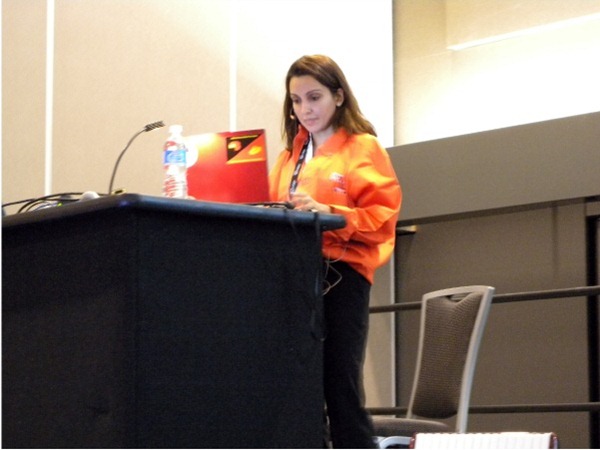
As I write this, my co-worker in Microsoft Canada’s Developer and Platform Evangelism group, Qixing Zheng, is doing the Expression Blend for Developers session. That’s right, it’s not just for UI designers – it’s also a pretty good development tool:
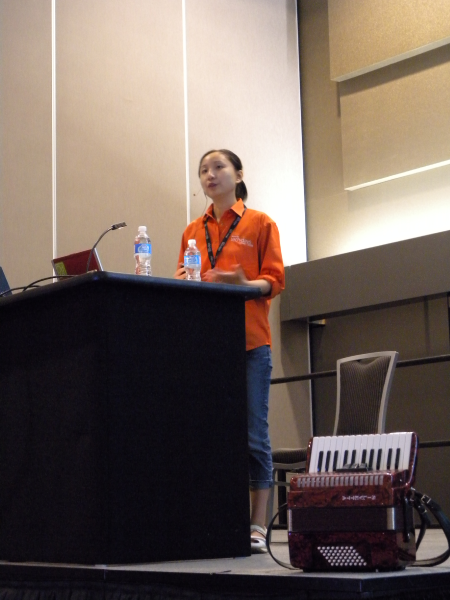
That’s right, we’re holding another FailCamp in Toronto! Mark Tuesday, September 29th on your calendar and be prepared to share you best/worst stories of FAIL, impress the judges in our “Panel of Fail” and win big prizes!
Here’s what the event is all about, as taken directly from FailCamp Toronto 3’s event page:
The pictures of Sean Connery in his ridiculous costume from Zardoz can only mean one thing: it’s time for another FailCamp!
FailCamp is a celebration of failure. It’s about sharing your tales of epic fail and the lessons you learned from them. It’s about learning not to view failure as defeat, but as a learning opportunity and stepping stone to success. It’s about taking away the fear of failure and learning to take a chance, think big and achieve what you thought you couldn’t.
We’ll start with some stories of historical failure: some you’ve read in the history books, and some culled from our own personal histories — the wisdom of fail through the ages. Then we’ll turn the microphone on you, inviting you to share your greatest stories of failure, challenging you to entertain the audience and even win prizes if our "Panel of Fail" deems your failure or the lessons derived from it to be the best of the bunch. The more embarassing, hilarious and educational your story, the better! Where else can you win big by losing big?
Joey deVilla (Microsoft, DemoCamp, accordion trouble-making) and John Bristowe (Microsoft) will host the event, encouraging you to confess your failures while sharing their own. FailCamp alumni Meghann Millard (Unspace, RubyFringe, FutureRuby) and Justin Kozuch (Refresh Events) and others will be the Panel of Fail whom you must impress in order to win prizes.
FailCamp takes place on Tuesday, September 29th at 7:00 p.m. at the Metro Toronto Convention Centre (255 Front Street West, between John and Simcoe Streets). Admission is free — all you have to do is register to attend, and make sure you bring your best story of fail! It’ll be full of win!
How to Work the Room at TechDays
 Can I work a room or can I work a room?
Can I work a room or can I work a room?
Why Work the Room?
If you’re attending TechDays (or any other tech conference this year), you should keep in mind that while we spend a lot of energy on the presentations and sessions, the opportunity to meet and talk to the other people there is just as important. I’ve observed that some of the most important things I’ve learned at conferences didn’t happen at the presentation, but in the hallways, conversing with the other attendees. This observation is so common that it’s given rise to “unconferences” like BarCamp, whose purpose is to invert the order of things so that the conference is more “hallway” than “lecture theatre”.
It’s especially important to talk to people you don’t know or who are outside your usual circle. Books like The Tipping Point classify acquaintances with such people as “weak ties”, but don’t let the word “weak” make you think they’re unimportant. As people outside your usual circle, they have access to a lot of information that you don’t. That’s why most people get jobs through someone they know, and of those cases, most of the references came from a weak tie. The sorts of opportunities that come about because of this sort of relationship led sociologist Mark Granovetter to coin the phrase “the strength of weak ties”.
The best way to make weak ties at a conference is to work the room. If the phrase sounds like sleazy marketing-speak and fills your head with images of popped collars and wearing too much body spray, relax. Working the room means being an active participant in a social event and contributing to it so that it’s better for both you and everyone else. Think of it as good party citizenship.
9 Ways to Work the Room
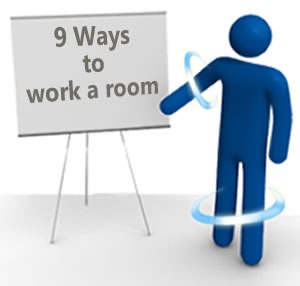 Here are some bits of advice for working the room at TechDays, culled from a mix of Susan RoAne’s advice in her books How to Work a Room and Face to Face: How to Reclaim the Personal Touch in a Digital World, Larry Chiang’s article in GigaOm on the topic and my own experiences working the room (which in turn led me to this job and is why you’re reading this blog entry).
Here are some bits of advice for working the room at TechDays, culled from a mix of Susan RoAne’s advice in her books How to Work a Room and Face to Face: How to Reclaim the Personal Touch in a Digital World, Larry Chiang’s article in GigaOm on the topic and my own experiences working the room (which in turn led me to this job and is why you’re reading this blog entry).
- Be more of a host and less of a guest. No, you don’t have to worry about scheduling and who’s running the AV rig. By “being a host”, I mean doing some of things that hosts do, such as introducing people, saying “hello” to wallflowers and generally making people feel more comfortable. Being graceful to everyone is not only good karma, but it’s a good way to promote yourself. It worked out really well for me; for example, I came to the first DemoCamp as a guest, but by the third one, I was one of the people officially hosting the event.
- Beware of “rock piles”. Rock piles are groups of people huddled together in a closed formation. It sends the signal “go away”.
- Beware of “hotboxing”. I’ve heard this term used in counter-culture settings, but in this case “hotboxing” means to square your shoulders front-and-center to the person you’re talking to. It’s a one-on-one version of the rock pile, and it excludes others from joining in.
- Put your coat and bag down. Carrying them is a non-verbal cue that you’re about to leave. If you’re going to stay and chat, put them down.
- Show and tell. We’re geeks, and nothing attracts our eyes like shiny, interesting pieces of tech and machinery. It’s why I carry my accordion around; I think of it as a device that converts curiosity into opportunity (and music as well). Got a particularly funky laptop, netbook, smartphone or new device you just got from ThinkGeek? Got a neat project that you’ve been working on? Whatever it is, park yourself someplace comfortable in the hallway, show it off and start a conversation!
- Save the email, tweets and texts for later, unless they’re important. They’ll draw your attention away from the room and also send the message “go away”.
- Mentor. If you’ve got skills in a specific area, share your knowledge. Larry Chiang from GigaOm says that “It transitions nicely from the what-do-you-do-for-work question. It also adds some substance to party conversations and clearly brands you as a person.”
- Be mentored. You came to TechDays to learn, and as I said earlier, learning goes beyond the sessions. One bit of advice is to try and learn three new things at every event.
- Play “conversation bingo”. If there are certain topics that you’d like to learn about at TechDays, say Silverlight, test-driven development, REST, and so on, put them in a list (mental, electronic or paper) of “bingo” words. As you converse at the conference, cross off any of those topics that you cover off the list. This trick forces you to become a more active listener and will help you towards your learning goals. Yelling “BINGO!” when you’ve crossed the last item on the list can be done at your discretion.
I’ll see you at TechDays, where I’ll be doing all of the above!
What is Ignite Your Career?
Ignite Your Career is Microsoft Canada’s webcast series on making the most out of your high-tech career. Hosted by my co-worker Rick Claus (Senior IT Pro Advisor) and Shane Schick (Editor-in-Chief of IT World Canada), it’s a series who goal is to provide you with information to help you make the best decisions for your high-tech career and answers to your questions. For the next four Thursdays starting tomorrow, Rick and Shane will take to seasoned pros from the IT industry about various topics, ranging from where the industry seems to be heading to maintaining your skills portfolio to “marketing yourself” to becoming a better leader.
You could call Ignite Your Career “platform-neutral”, as the topics covered apply to all developers and IT pros, whether or not they work with Microsoft tools and technologies. If you have a career as a developer or an IT pro, or a mix of the two, or if you manage developers and IT pros, this webcast is for you!
What’s the First Webcast About?
Tomorrow’s webcast, the first in the series, is titled Industry Insights and Trends. Here’s the abstract:
In this webcast, we are revisiting one of the most popular topics we’ve had on the ongoing Ignite Your Career webcast series to kick of this season. Industry Insights and Trends. The nature of Technology is one of continual change; a fact of life for professionals in the ICT Industry. As a result, you need to be on top of what is happening in the industry in order to position yourself and your organization to benefit from these trends. This panel discussion will arm you with the information you need from experts in the ICT industry in order to stay on top of your game.
The panel for this webcast will consist of Richard Campbell (host of .NET Rocks!), Jay Payette, Lorie Baddock and Lee Jacobs.
For this webcast, we’re offering a choice of time slots:
- Session 1: Thursday, September 10, 12:00 p.m. – 1:00 p.m. Eastern (9:00 a.m. – 10:00 a.m. Pacific) [register]
- Session 2: Thursday, September 10, 3:00 p.m. – 4:00 p.m. Eastern (12:00 p.m. – 1:00 p.m. Pacific) [register]
For more details or to register, see the Ignite Your Career site.
